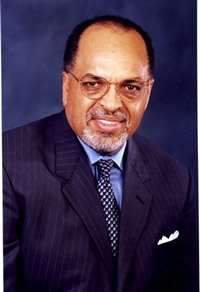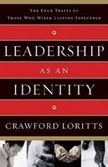 The following are my answers to some questions on leadership I gave to Crawford Loritts for his new book called Leadership as an Identity: The Four Traits of Those Who Wield Lasting Influence. The book includes contributions from various Christian leaders, including Bill Bright, D. A. Carson, Clyde Cook, Steve Douglass, Robert Lewis, Bill McCartney, Robertson McQuilken, Gary Rosberg and Joseph Stowell.
The following are my answers to some questions on leadership I gave to Crawford Loritts for his new book called Leadership as an Identity: The Four Traits of Those Who Wield Lasting Influence. The book includes contributions from various Christian leaders, including Bill Bright, D. A. Carson, Clyde Cook, Steve Douglass, Robert Lewis, Bill McCartney, Robertson McQuilken, Gary Rosberg and Joseph Stowell.
A number of my answers are in Crawford's book, some are abridged, but I thought I'd share my full original answers with you here.
How has brokenness affected your life and enriched your approach to leadership?
To me brokenness is more than just periodic times of intense emotional experience; it’s an ongoing sense of inadequacy. When I come to a point, as I face life’s difficulties, where I know I can’t just fix things, including myself, it’s a much-needed reminder that He’s the Vine, I’m a branch, and apart from Him I can do nothing. Sometimes well-meaning people have tried to talk me out of my sense of inadequacy. Actually, this sense is vital to fruitful ministry. Furthermore, it’s rooted in reality—in and of ourselves we are inadequate, and we must come to terms with that. When I don’t recognize my inadequacy, I trust myself rather than Christ. What are some of the things younger leaders need to be careful of with regard to the relationship between pride and their influence as a leader?
What are some of the things younger leaders need to be careful of with regard to the relationship between pride and their influence as a leader?
God says He opposes the proud and gives grace to the humble. So, do I want God to give me grace or to oppose me?
Duh…..
Pride is delusional. And it’s never in my best interests.
People easily sniff out pride, and they will not trust a proud leader. They may admire his skills, but that is not trust.
When I was a young pastor I thought I knew how to do everything. After many years, I realized how stupid I was. Young leaders need to seek out experienced leaders who are humble, and sit at their feet. They need to stay away from the proud, strutting leaders who stand under God’s judgment and are time bombs soon to go off—“pride goes before destruction.”
Wisdom and age should be partners, but it doesn’t always work that way. Age with humility brings wisdom. Age with arrogance just brings a longer track record of being foolish.
In your view, what are the qualities of an authentic Christian leader?
He loves God with all his heart, is quick to admit his flaws, listens to his critics and doesn’t dismiss them. He humbly accepts people’s thanks, but deflects praise to the only One worthy of it. He seeks God’s face and listens to Him daily. A. W. Tozer said, “Listen to no man who has not listened to God.”
What is the relationship between the tasks/assignments God gives to you as a leader and your walk with Him?
God gives me no task except that which requires my dependence on Him to do it. Therefore, there is nothing I should regard as automatic. No conversation should be on auto-pilot—I need to ask His guidance, ask His wisdom and empowerment that I will say words pleasing to Him, not careless words I will have to give account for in the Day of Judgment.
The more conscious my dependence on Him, the more I will pray without ceasing. Throughout the day I often go to my knees asking Him to sustain me, as I research and write and interact with people. Even when I respond to emails I need his guidance. Just today I sent off an email, in response to a critic, and my thoughts were ill-conceived. I’d had an inkling, the still small voice of God, that I really shouldn’t be saying what I was, that I was being defensive. But like a dope, I sent it anyway. I had to go back and make the situation right. It would have been easier, not to mention just plain right, to have obeyed Scripture in the first place by being slow to speak.
In what ways has God used what He has called you to do to reveal more of Himself to you and to the people you serve? Much of my life is invested in writing. In long lonely hours of writing, in the middle of the night, I have often asked God, “Is it worth it?” and He has gently reassured me it is. This happened regularly when writing my book Heaven. I have repeatedly experienced His grace and kindness when I’ve called out to Him…and a great sense of discouragement when I haven’t.
Much of my life is invested in writing. In long lonely hours of writing, in the middle of the night, I have often asked God, “Is it worth it?” and He has gently reassured me it is. This happened regularly when writing my book Heaven. I have repeatedly experienced His grace and kindness when I’ve called out to Him…and a great sense of discouragement when I haven’t.
In these challenging times, Jesus has truly showed Himself to be my best friend, not just in theory, but in reality. Not only do I call upon Him to help me accurately handle His Word when writing nonfiction, I ask Him for ideas and direction to craft quality stories in my fiction-writing. He is the Creator, the Genius, the Master Story-teller, and I want to be a reflection of Him, even a pale reflection. I want my words to be tools of His Spirit.
Nothing’s more thrilling than to hear people say that God has changed their lives through something I’ve written. If I imagined that was because of my genius, it would make me proud. But because I have repeatedly called upon Him for help in the process, when I hear these stories, I am filled not with pride, but sheer amazement and gratitude to Him.
What have you learned about serving while leading?
That leading is serving and serving is leading. The shepherd leads by giving himself to the sheep. The Good Shepherd owns the flock, the undershepherds don’t. We don’t shepherd our flock, but His flock: “Be shepherds of God’s flock that is under your care, serving as overseers” (1 Peter 5:2). So overseers are servants caring for their Master’s flock.
This is the ultimate paradigm shift. Peter then tells us we should not be “greedy for money, but eager to serve.” Too many leaders are eager to be served, not to serve. We like to be called “servants,” but resent it when we’re treated like servants.
1 Peter 5 then describes leaders as “not lording it over those entrusted to you, but being examples to the flock.” Examples of what? Examples of Christlike service, in which we put others before ourselves.
Leaders should never use God’s flock to build their kingdoms and reputations in order to further themselves. Rather, they should set the example of humble service. We need more humble leaders, not self-promoting celebrities who know nothing of the servant-leader model exemplified by Christ.
What gives longevity, “staying-power” to Christian leaders?
A long obedience in the same direction, to borrow a Eugene Peterson phrase, is sustained by the small choices we make each day. We need to be acutely aware of the cumulative nature of our little choices. What I eat and whether I exercise will determine the state of my body. Whether I read scripture and great books, or watch TV and listen to talk radio, will make me into the person I will be five years from now. I should discipline myself today, not for discipline’s sake, but for the purpose of godliness (1 Timothy 4:7, 8).
Is there anything else on your heart that you would like to share about being a Christian leader?
I view leadership as a privilege, not an entitlement. Too many of us act as if we deserve a leadership role. We’ve worked hard. So what? The guy at the tire shop works hard, the young mother works hard, the farmer works harder than we do.
We have skills. So what? The athlete has skills, but where do they come from? God. “What do you have that you did not receive? And if you did receive it, why do you boast as though you did not?” (1 Corinthians 4:7). When we start thinking we’re special, that we’ve earned people’s respect, that we have a lot to offer, then we become proud. That means God is opposed to us, and we are operating outside of the grace that He only gives to the humble. That makes us a fall waiting to happen: “Pride goes before destruction and a haughty spirit before a fall” (Proverbs 16:18).
God knows the hearts of leaders. If we are in this for fame, money, or power over people (including the power of ego-feeding or sexual seduction), God knows and He will bring His hand of judgment upon us. “It is a dreadful thing to fall into the hands of the living God” (Hebrews 10:31).
But if we are broken, humble, quick to admit and confess our weaknesses and sins, He will shed His grace upon us, comfort us, and empower us. Then, and only then, we will be Christlike and Christ-exalting. Then, and only then, we will be leaders worth following.
Photo: Christianpics.co




